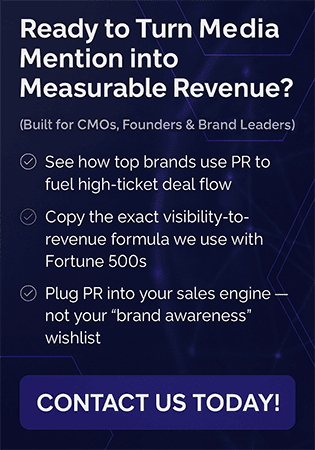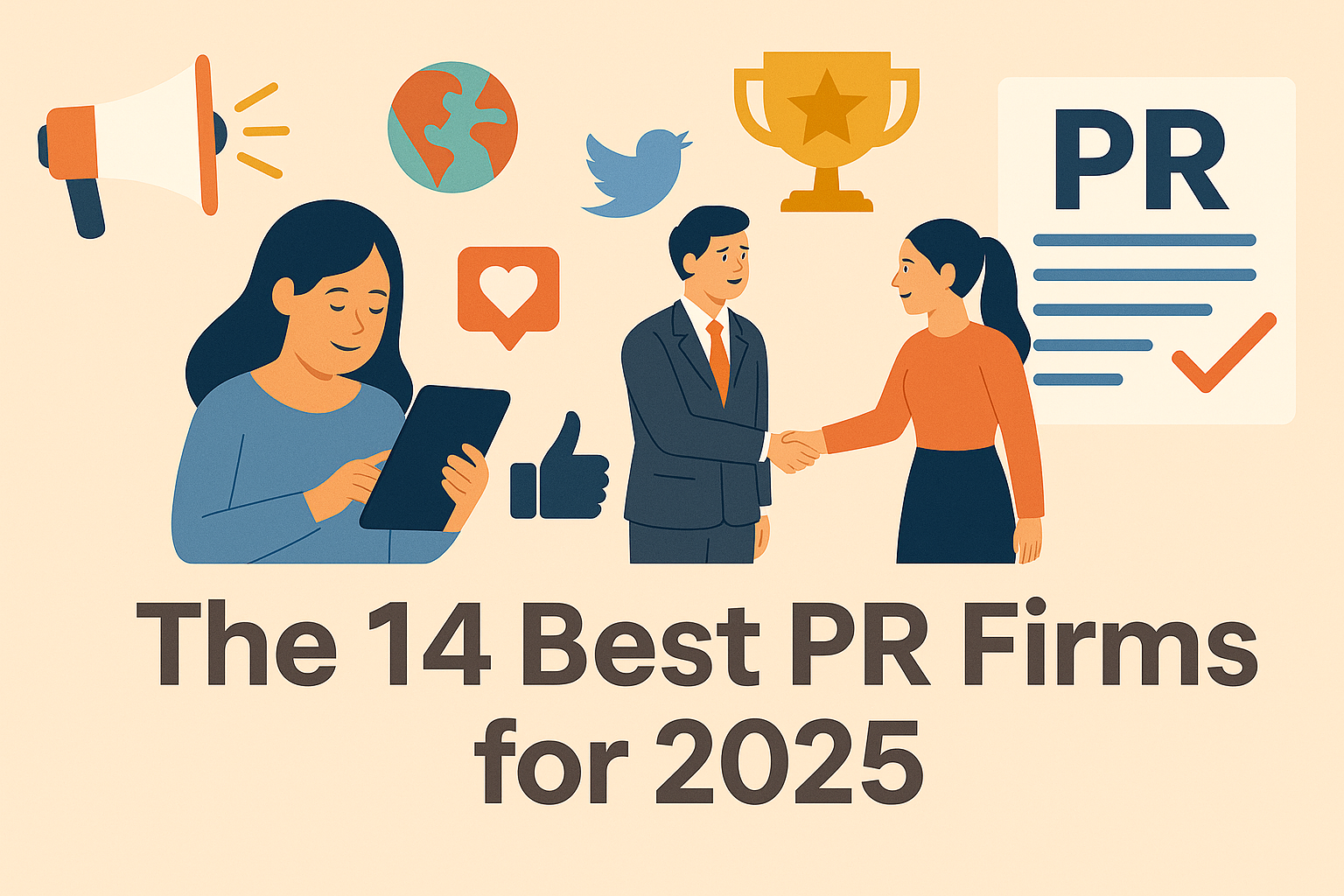A Brief Background of Public Relations
The idea of using communications to maintain a positive reputation and influence has been around for a long time, but public relations itself is considered a relatively new profession.
The foundation of PR goes as far back as Ancient Greece. However, despite these origins of the past, it was the dawn of mass communication at the turn of the 20th century that led to what we refer to today as the public relations industry.
PR has evolved over the last few decades just as media channels have. Along with it, the role of publicists and PR agencies have shifted as well.
We began with traditional PR, which is a direct approach that uses conventional channels such as television, radio, newspapers, and magazines to promote a positive brand image through earned placements in news stories and media editorials.
Now, we are in the age of digital PR. Similar to traditional PR, digital PR aims to increase brand awareness through online methods. This idea of “new” PR entails communicating through multiple channels along with podcasts, guest posts on reputable blogs, and/or using influencer relations to advertise your brand in front of potential customers. Furthermore, this new age of PR also entails the use of these channels for a range of practices such as LinkedIn events, product hunt campaigns, Twitter chats, and more.
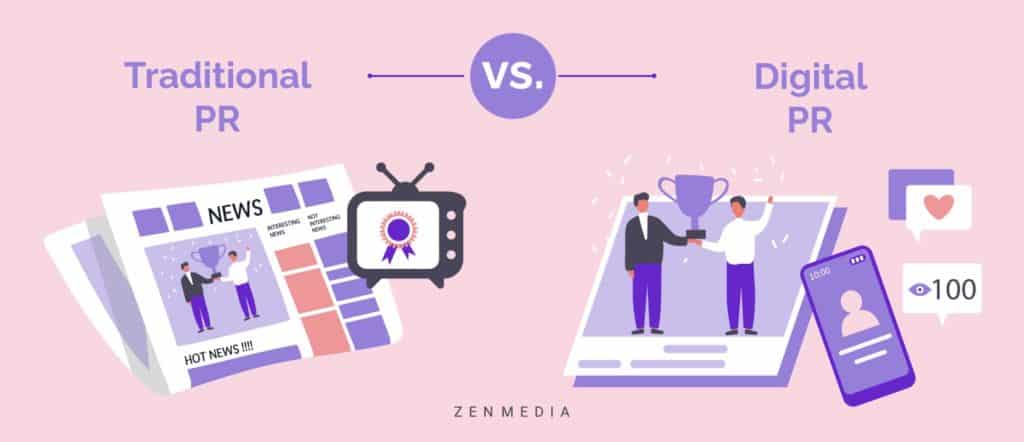
There isn’t a one-size-fits-all approach to PR. The truth is that the ideal PR campaign is a combination of traditional and digital PR. Utilizing both PR sectors allows you to capture a much wider audience through different methods of communication. For example, you can use social media to capture an online audience, but then use traditional offline methods such as TV and radio for those without active and attentive social channels.
Related post: Digital PR vs. Traditional PR: Which is Better for Your B2B Company?
Overall, traditional and digital PR each have their own set of strengths, but when combined, they have the potential to exceed your expectations in increasing brand awareness, driving traffic, and maximizing leads.
What is the role of a PR Agency?
The role of a PR agency is to advise clients on communication.
PR professionals should have their finger on the pulse of public opinion, and they should use that insight to analyze and anticipate any issues the organization may have. They should also use their insights to see how they can insert their client’s brand into public conversations in a positive way.
PR professionals work to promote the company’s mission and goals through external means such as press releases, preparation for speeches and interviews and providing counsel on digital campaigns and projects.
The PR agency will measure the outcomes of the organization’s efforts and adjust and refine goals as necessary throughout a campaign. PR professionals may look at the company’s competitors when refining a strategy. Using competitive analysis, PR professionals can identify what top competitors are doing and how they can respond, compete, and take on a larger share of voice.
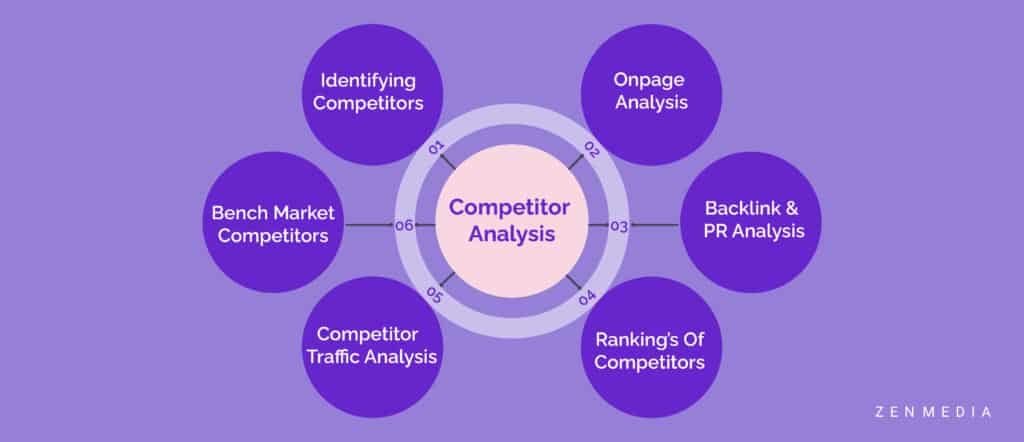
PR agencies should act as resources for their clients, providing data-backed guidance to help businesses grow their external communication strategies. A strong PR agency is a true partner and will interact not only with business leaders but also with internal marketing and communication departments. Together, PR and Marketing can drive awareness, credibility, and trust—positioning consumers to convert.
What does a PR Agency do?
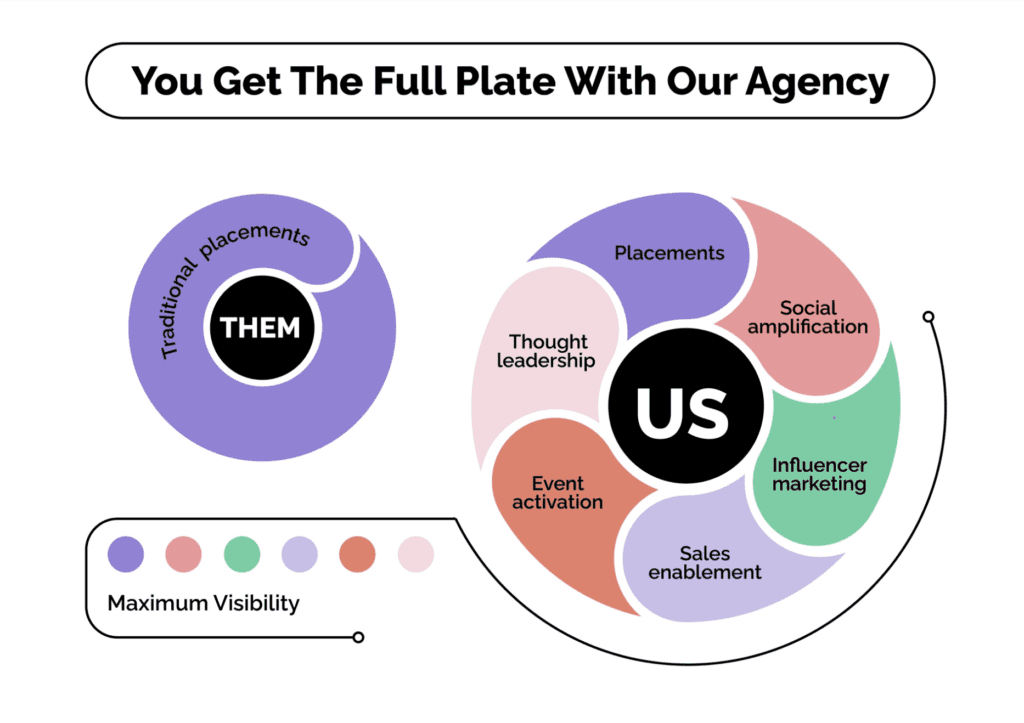
Media Relations
Top PR agencies have well-known connections with the media. They can create targeted media lists in order to exemplify your brand’s thought leadership in relevant publications.
Live events, AMAs, Twitter Spaces
PR agencies are a great resource when it comes to setting up and promoting events.
They can help plan and set up strategic promotional events and experiential marketing opportunities. They reach out to media contacts, encouraging attendance and coverage of your events. And they can ensure that your events span the physical and digital worlds by including in-person and online components.
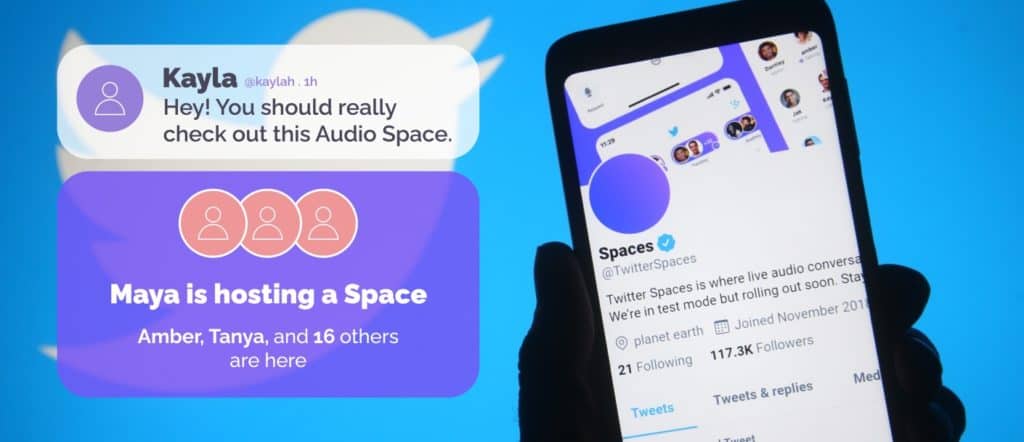
Product Hunt campaigns
A PR agency is essential when it comes to releasing new products. They have insights into programs and strategies, like Product Hunt—a website that allows makers and marketers to launch their products or services and get in touch with their first real users. These users can vote and leave honest reviews on the product.
PR agencies can set up product hunt campaigns for their clients by preparing their client’s website for the launch and making sure that everything works before taking the product public.
Crisis communication/management
PR plays a big role when it comes to crisis management since PR is fundamentally all about presenting and maintaining a particular brand and public image. In the event of a crisis, the PR team will act promptly to address the crisis and create proper messaging to be presented to the public.
The PR agency can then walk all key audiences through the issue or concern, preventing rumors from taking form and shutting down inaccuracies and misinformation. Lastly, PR professionals can determine the best strategy to show the brand’s honest and authentic concern, helping position the brand in a way that shows that the business truly cares about any harm committed. Authentic penance for a misstep or unfortunate outcome can help the media present a multi-faceted story as opposed to an us vs. them narrative.

Drive more qualified leads
PR is key to driving more qualified leads.
With a solid buyer persona in place, your PR strategy should be easier to implement. The PR team can target the personas, writing quality content, such as optimized press releases, blog posts, LinkedIn posts, videos, white papers, and even case studies.
PR can also drive more leads through the use of earned media. A guest blog in a key media outlet is a great way to not only earn visibility and leadership positioning but also to direct more leads back to your site.
Nurture prospects and clients
Lead nurturing (the act of nurturing prospects) is the process of cultivating leads that are not ready to buy just yet. Lead nurturing helps marketers and PR professionals define the needs of the buyer based on who they are by using profile characteristics, title, role, industry, and so on.
Press by the PR team can be developed into sales assets for sales enablement. By nurturing these possible buyers, the business is able to keep them engaged by providing relevant content for their situation. Nurturing can also help with active clients by giving them information they may need when making a purchase. Whether they are prospects or clients, a PR team that practices nurturing through the use of press can drive more revenue by following the activity and behaviors of visitors on their site.

Build and manage brand authority
PR is a sure way to build authority for your brand. People trust brands with a strong voice and presence, and PR is a key strategy for building that. A strong PR campaign includes focusing on the key characteristics and unique selling points of your company. More ways to build brand authority include answering your customers’ questions, creating reports and studies, associating with other authoritative brands, and publishing content on trustworthy websites. These tactics will gain media coverage and help you earn high-quality backlinks, which will signal to Google that you’re an authority.
Community building
Building a community is essential to growing your business, and a PR agency can be a major ally in helping you achieve this. PR agencies perform vital outreach that can help connect your business with industry publications and professionals. Many PR firms have established connections with professionals throughout multiple industries and are eager to help your business establish and grow its own connections both inside and outside of your industry.
Influencer Relationship Management
A PR team is essential when it comes to handling influencer relations and executing a B2B influencer marketing strategy. Seasoned PR teams can identify influencers that best fit their client’s niche and have a high chance of reaching the desired target audience. Their ability to recognize the best social channels and influencers to promote a brand’s message helps maximize reach, boost brand awareness, and gain new customers.
Media training
Media training is a specialized form of communication training that helps individuals and businesses anticipate reporter behavior and avoid common traps. Strong PR teams will have proven strategies to help prepare their clients for interacting with the media. They educate clients on media tactics, brand messaging, keywords, and general media skill sets, like speaking clearly, staying on message, and speaking with confidence.
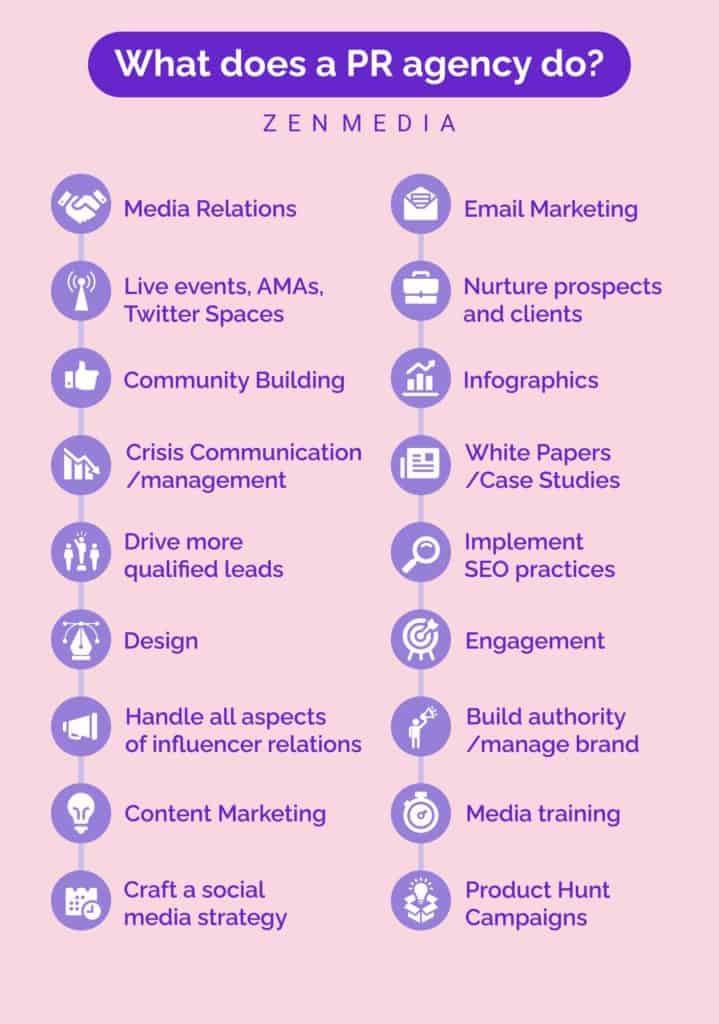
How will a PR Agency Collaborate with an In-House Team?
Even companies that have an internal marketing communications team can benefit from hiring a PR agency. A PR agency will expand and build upon an internal marketing communications team’s efforts, not compete with them. An internal team can help inform a PR agency’s strategy from the beginning of the relationship, dividing and conquering the most effective strategies and tactics to improve a company’s marketing communications plans.
It’s important to note, however, that there are distinctions between PR agencies and full-service marketing agencies (like us at Zen Media). Both can collaborate with an in-house team, but considering those differences is the key to picking the right PR or marketing partner from the get-go.
So what are those distinctions? Well, a PR agency will focus more strictly on PR development and hits. Not to say that a PR-focused agency won’t expand into other areas, but generally, companies can expect a PR agency to cover the bases outlined in the previous section. A full-service marketing agency, however, will include other marketing tactics like SEO, social media strategies, sales collateral, and more. (And a full-service agency will still work collaboratively with an in-house team!)
Here are some ways companies can expect an agency to collaborate with an in-house team:
Email Marketing
Email marketing and PR coexist and reinforce each other.
They overlap in that both focus on delivering relevant information to the public in a timely manner. B2B email marketing is a great opportunity for marketing or communications teams to collaborate with PR to amplify PR hits and advertise for upcoming PR opportunities like live events. A good PR team can also take the content created by an internal communication team and find ways to help get those ideas out to the public. For this reason, we recommend that all PR, marketing, and communications departments collaborate. This collaboration will help ensure that each PR hit gets shared in company newsletters or linked in company blogs and that PR can take ideas from existing blogs for pitch opportunities.
Related reading: The Ultimate Guide to B2B Email Marketing
Infographics
Infographics are a form of visual communication that bring important thoughts to the right audience in an easy, fun way. PR agencies can work with marketing and design teams to create engaging infographics instead of sending out a report on their latest study. Full-service marketing agencies may even do all the work for you by developing and designing the appropriate infographics to insert into a company’s campaign. Infographics are an excellent way to simplify complex numbers and text through clean and clear-cut visuals.
Infographics also create emphasis and provide conclusions. For example, many agencies publish studies using a variety of graphs and charts to come to several conclusions, and reading through those data-heavy reports can be a slow and arduous process. Infographics cut through the lengthy spreadsheets, graphs, and text to present clear conclusions. In general, they work like good blog posts—they offer the reader focus and emphasis on one thing to open a discussion.
Related post: Top 6 Most Requested Content Types & The Most Shareable Content
Sales Collateral: Testimonials, White Papers, Case Studies
Sales collateral—or pieces of content created based on a client’s experience or direct feedback—are essential pieces of content that PR teams can use to build pitches and stories for the media. Case studies are a great way to show how valuable your services are in the marketplace. They can include testimonials from previous clients alongside examples of how you solved a customer’s problem and helped them achieve success. For a less narrative approach, white papers are persuasive, authoritative, in-depth pieces of content that are drafted to explain a specific issue, topic, or technology. In the end, both pieces of content will benefit from the input of the PR team as they determine whether or not they will prove to be a success for your company and the one you are writing about.
Implement SEO practices
PR agencies can implement SEO practices into their strategy for website visibility. By doing so, the team can improve the company’s reputation, build trust and authority, increase sales, and drive organic traffic. All this is done by first deciding on a master list of keywords and finding the right channels, either in collaboration with an in-house team or developed by a full-service agency. Then the team can then get into the actual optimizing. Optimizing everything from your site to blog posts and even videos are done through your keywords. By adding them around your site, within posts, in the meta title, and meta description, you can begin to rank for popular search terms.
Another way to build trust and authority is through outreach or cold emails. This is the practice of reaching out to high authority publications and providing them with a well-informed guest post. By doing so, you can be granted permission to insert a link back to your site within the post. This is the beginning of your link-building strategy but also a means of establishing your credibility within the community.
Craft a Social Media Strategy
The first step of any social media marketing strategy begins with researching a target market. You can’t possibly market your product if you don’t know who is looking for it and what they are looking for. PR agencies can find and define their target markets using a number of different ways.
First, they look at your current customer base and understand why they buy from you. They then move on to looking into your competitors and see who they are targeting. Once this is reviewed, the PR team can choose specific demographics to target.
Next comes creating the buyer persona. A buyer persona is a detailed description of your target customer and their demographic, hobbies, interest, desires, pain points, and more. Since the PR team now has more information on your audience, it is easier to develop a persona. They will look into important aspects to create this persona, such as social media data, audience insight tools, and customer surveys to create a well-rounded buyer persona. This will help them understand how your product or service will fit into your target market’s lifestyle and how you can present it to them. Once you have the answer to these questions, the actual targeting part becomes much easier as you will have a clearer idea of what will resonate with them.
Content Marketing
Most PR agencies will have an assigned copywriter or content team that works to create optimized content for your business. They will work closely with the client to develop content plans that include what content to create and where/when to publish it. Content creation for PR campaigns can look different based on the kind of client. Some ways content comes into play is through traditional press placements—the PR team will notify the copywriter or content team of a placement, and they will work with the client to write the article.
In a full-service agency, content marketing can also include developing content for blogs, social media posts, or newsletters. Each of these types of content can be leveraged by PR to help build a media-ready story.
Related post: The Role of Content Marketing in the B2B Buy
Design
PR agencies routinely work on updating and sometimes even reinvent their client’s brand and design strategies—everything from web page layout to brand color scheme and more. Many PR teams have in-house designers that will work to design visuals for their clients, including pictures for blogs or social media content. But a PR-focused agency may not have the bandwidth to dedicate to reinventing a company’s design and will likely rely on an internal team for web development and technical aspects. A full-service agency is more prepared to take this on. Designers play a major role in developing the visual footprint of their clients and helping them stand out from the competition.
Related post: The Best Ways to Use B2B PR to Support Your Branding
Engagement
When agencies talk about brand engagement, they usually mean customers are engaging with the brand via social media, the client’s website, or any other avenue that puts the customer in direct contact with the brand. PR agencies manage this engagement through various metrics, including likes, comments, and shares on social media, as well as clicks and search engine placement for the client’s website. PR agencies can maximize engagement through many strategies, including providing insightful content that entices viewers to learn more about the client’s product or service. It’s important to note that PR agencies can only measure what they are in charge of, so if you’re looking for an agency to manage everything from stem to stern, a full-service marketing and PR agency will likely be a better fit.

Benefits of Hiring a PR Agency
Professional expertise on the topic
It’s common sense—there are numerous benefits that come from working with professionals. And this is especially true when a big part of the job is having, maintaining, and leveraging relationships. PR agencies are key for getting your story into the right publications, building authority for your brand, and maintaining buzz.
PR agencies that specialize in all things marketing and communication are even more valuable than PR-specific firms, as they have the resources and expertise to take each press hit and turn it into its own marketing campaign. While your organization may have a limited number of people dedicated to marketing and communications, an all-inclusive marketing and PR agency is set up to put 100% of its focus into partnering with each client’s internal team and bringing their message to the masses.
Increases brand awareness and credibility
A good PR team will help your organization get recognized as a credible and well-respected brand both inside and outside of your industry. With a PR agency to help you produce optimized and well-researched content, your brand will be able to boost its rankings as one of the premier sources of information in your industry, leading to higher lead generation and, ultimately, higher revenue.
It’s important to remember that your PR team is an extension of your own team, and they can be a prime source of information when it comes to understanding how a business decision might impact your image or consumer perspective. PR teams can help you prepare for potential PR crises or problems, and they can also increase overall productivity by helping provide more materials for your internal marketing or communications team leverage. PR hits, guest spots on podcasts, and awards won are all great events that your team can publicize internally to your employees and externally on your website, blog, or social media.
Related post: Here’s How to Build Trust In Your Brand in 2022
Media contacts
A PR agency can also provide major benefits for your business by using their connections in your industry to help open doors for your company. B2B PR agencies specialize in expanding their knowledge on niche business sectors and can use that industry knowledge to help benefit your company—they may be able to connect you with a strong business partnership or help you set up a guest post swap and each other’s blogs.
Attracts precise target market
Knowing who to target and prioritizing quality over quantity is another benefit of PR agencies. Instead of wasting time and money on contacting people who probably aren’t interested in your business, PR agencies can dedicate their resources to targeting specific groups of people who are more likely to be interested in working with you.
PR specialists realize that not every brand is suited for every type of social media platform or media opportunity. A B2B PR agency knows how to position your business, so it attracts your target market, saving you time and money—and giving you a better ROI!
What to Consider When Hiring a PR firm
Expertise in your industry
When hiring a PR agency, you want to make sure you find one that has the right expertise for your needs. You also want to find a company that is well-established and has been around for the long haul.
Consider what type of company you have and what type of message you want to promote when selecting a PR agency. For example, if your company sells clothing, you might want a PR firm that specializes in fashion or retail. If your company focuses on technology, you might want a PR agency that specializes in B2B marketing or tech startups.
Full transparency
It’s also important to consider what you’ll get for your money. Does the agency provide a creative brief? Do they come up with creative ideas—or do they leave that to you? What is their turnaround time? How often will you receive updates during the process? Is there a contract?
You need to make sure you understand what you’ll get for your money and the kind of return on investment you can expect from their services. If a PR agency isn’t fully transparent when it comes to money and fails to provide you with a clear answer in regard to what you can expect, you should see red flags—and heed their warning.
What Questions Should You Ask a Potential PR Firm?
Hiring a PR firm for your company can seem like a daunting task, but if you do your homework, you will be able to select a reputable firm that meets your needs and gives you the best possible return on your investment.
It takes some legwork, but it’s worth it in the end!
To help guide you in this process, here are nine questions that all B2B brands should ask when interviewing agencies:
- What kind of companies make up your clientele?
- Do you have a good relationship with journalists?
- Do you have a diverse team?
- How do you know when it’s time to give up on pitching a story?
- Can I see samples of your work?
- What is your strategy for getting me press coverage?
- How much can I expect to pay for your services?
- Can I speak with some of your past clients?
- And lastly—What happens if I don’t get what I want from the media exposure that your PR firm promised?
Related post: 8 Signs Your PR Strategy Needs a Professional
Conclusion
A good PR agency will help your brand get noticed and drive more traffic to your business. A great PR person can give you the advantage when it comes to getting noticed and capturing customer interest. But hiring a PR agency alone isn’t enough. Your brand perspective is critical to drive success and avoid common pitfalls.
Not sure how to get started with PR? We’ve got you covered.


